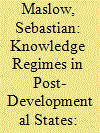| Srl | Item |
| 1 |
ID:
178890


|
|
|
|
|
| Summary/Abstract |
Between 2009 and 2014, against the background of the Xinjiang ethnic unity education textbook reform (2009–2010), vigorous academic debate on China's ethnic policy reform took place. Two academic cliques – one championing reform and the other representing the status quo – gradually came to the fore in this debate and competed to influence policy. This research seeks to unpack the mechanisms in China's knowledge regime that allow one agent (such as a think tank or academic) to prevail over others. Agents have an impact on policymaking mainly through connections with the decision-making body. This research uses three variables (ideological connection, level and nature of the connection) to analyse the relative policy influence of different agents in the debate. This research is among the first to provide an in-depth analysis of the debate's policy impact at the local level. The reform clique prevailed in this case because of its ability to bond with and influence higher-level decision-making bodies. Beginning in 2014, the Chinese Communist Party officially adopted the reform clique's language because of its alignment with the Party's growing need to maintain security in ethnic minority areas. Furthermore, key reform clique players continue to have an impact on the national policy shift.
|
|
|
|
|
|
|
|
|
|
|
|
|
|
|
|
| 2 |
ID:
158499


|
|
|
|
|
| Summary/Abstract |
Tracing the mechanisms of policy change, recent studies of knowledge regimes in Western democracies have examined the reciprocal relationship between a state’s institutional features and the role of think tanks in the production and dissemination of policy ideas. This paper expands the focus to East Asia and examines the role of think tanks in Japan. With a strong bureaucracy functioning as the primary repository for policy expertise, Japan’s developmental state has long been discouraging the creation of independent think tanks. Yet, Japan’s bureaucratic and electoral reforms in the 1990s have opened new access points to the policy process, encouraging the growth of new think tanks in addition to Japan’s semi-governmental and corporate research organizations. By looking at the Abe government’s national security discourse and Japan’s debate on participation in the Trans-Pacific Partnership Agreement during the period 2012 to 2015, this article assesses the role of external policy advice in Japan’s post-developmental state. The study illustrates the link between Japan’s changing political system, the changing nature of its knowledge regime, and the structural conditions under which think tanks yield influence in Japan. By doing so, this article offers evidence of an increasingly competitive think-tank landscape structured along the conservative and progressive political spectrum of policy ideas, and unpacks the strategies by which think tanks penetrate Japan’s policymaking process. However, despite the enhanced role of think tanks, the findings also point to the sustained prominence of individual intellectuals and academics in advising Japan’s decision makers.
|
|
|
|
|
|
|
|
|
|
|
|
|
|
|
|